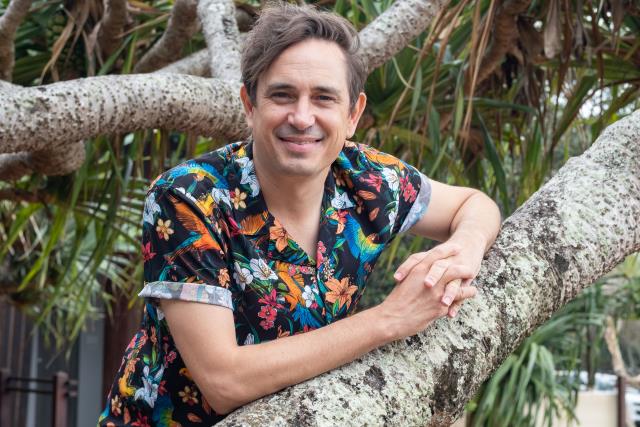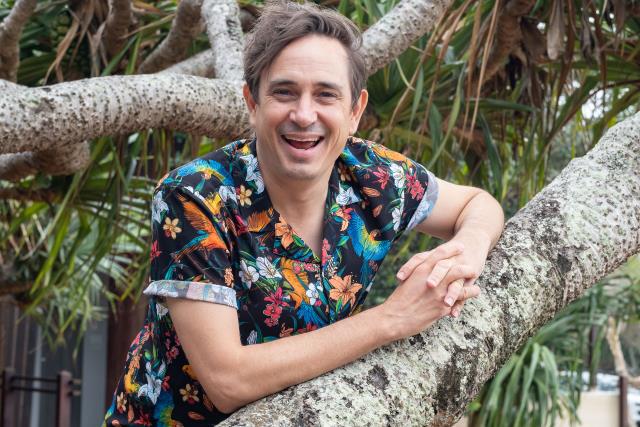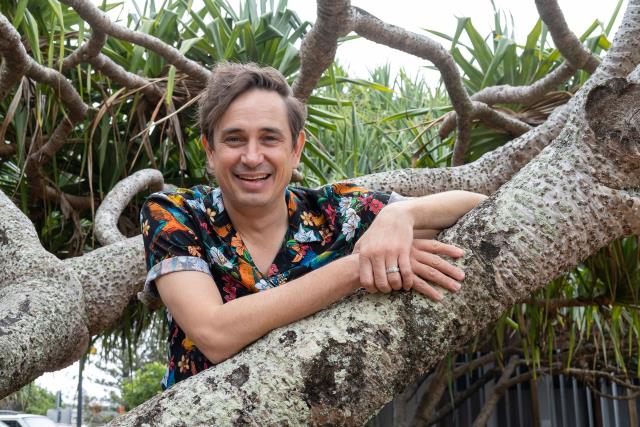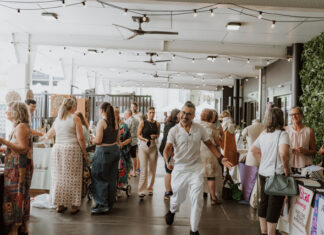Bestselling author Trent Dalton finally made it to Noosa last weekend where he was mobbed by adoring readers as they snatched up copies of his new work, Love Stories. PHIL JARRATT managed to drag him away for an intriguing conversation about love and perfect strangers.
PJ: Your series of articles for The Australian Weekend Magazine in early 2020 on the residents of Sunny Avenue seems to have been the genesis of Love Stories. Is that a fair comment?
TD: Yes, and thanks for brining that up. In the book I thank Tracey Gregg and all the residents for inspiring me. At that time I was coming off the back of all the madness surrounding the release of my first novel, Boy Swallows Universe, and I just needed to get back to what I do, telling other people’s stories rather than talking about my own, which I’d been so caught up in. That book is so autobiographical, delving into deep, dark tales that existed in the back of my mind. I wanted to return to what I absolutely love about journalism, which is talking to random strangers. It’s been my bread and butter for more than 20 years and it’s my favourite thing to do. So I told my editor I wanted to walk up and down a suburban street and tell six stories about the people who live there, how their lives interlock. It was so good for the soul to just door knock and sometimes get the door slammed in your face or have people accuse you of trying to sell them solar heating or something. I’d say no, I just want to write the story of your life.
PJ: By then you’d become quite famous quite quickly. Did any of them know who you were?
TD: Well, the woman who was key to the whole thing, Tracey Gregg, grabbed me and said, ‘You have to come in right now!’ And she took me into the kitchen and showed me the book she’d just finished reading – Boy Swallows Universe. So she introduced me to her neighbours, told me which ones had the best stories. Writing that series was so good for me, and it made me think that this was an area of journalism I should visit more often. To me it’s really exciting to start gathering stories from people you’ve never met and you know nothing about. You really don’t know where it’s going to go, what’s going to happen or where the narrative will take you. For a writer, that’s a great place to be.
PJ: I think it takes a special kind of journalist to be able to do that. A lot of us are frightened of rejection by strangers. I have nightmares about sitting at a table in a shopping centre trying to interest people in my new book, for example. Most reporters are used to approaching strangers in a context that they can understand, like, did you see the accident and can you tell me what happened?
TD: Well, when I sat on a street corner with my Olivetti for weeks, collecting the material for this book, it was so exposing and I felt so vulnerable. Mate, I was sitting for eight hours a day on the corner of Adelaide and Albert [in Brisbane] looking like a complete goose. It was so wonderful when strangers would come up and go, okay, I might throw this douchebag a bone. A lot of the time, that was where the story began, with people scratching their heads and wondering what the hell I was doing, that there must be some ulterior motive. I’d go, no, no – I just want to hear you talk about someone you love. When they realised that this was really on the level, they’d just let it out and I’d shut up and listen, sometimes for hours. They’d be in tears, I’d be in tears, and they’d realise I was for real.
PJ: Did anyone get aggressive?
TD: You’re in the middle of the city and you’re going to meet all kinds. This one guy was clearly agitated when he saw me, and he walked over and said, ‘I’ve got a love story for ya. How about I bury your f____ing head in concrete!’ That happened on my 42nd birthday, and I kind of thought, what a great story this would be, a guy drives my head into concrete on my birthday while I’m trying to get stories about love! But I just told him again that I wanted to hear love stories, and he didn’t know how to react to that, so he just kind of walked away.
PJ: Did people give you stories you didn’t want to hear?
TD: Well, sometimes they’d go into some very strange places, but when you’ve asked them to tell a story, there’s no way you can dodge it. You have to dive in and go with them. That’s the nature of real listening. And if you persist, along comes a Kerry Shepherd who can’t take the photos of her dead husband off the fridge eight years after he died, or the couple who’ve been married for 57 years and the husband knows exactly how many hours that means he’s loved his wife. Stuff like that balances it out.
PJ: Did a lot of stories hit the cutting room floor for one reason or another?
TD: For sure. I mean, I sat on that corner with the Olivetti for about two and a half weeks, but for another month or so I just walked around the city tapping people on the shoulder. I mean, a guy holding a one-year-old baby – you know he’s going to have a lot of love to talk about, because I’ve felt that. Two young women, resting their foreheads against each other, just so much in love, that’s pretty safe too. But the ones where I’m sitting on the corner, there was no way of telling, so some stories would dovetail into others, and some would be too similar to another one I’d already got. But cutting any of them out was a painful process. I remember there was a woman who told me how she could converse with animals, a former vet, and she told the most beautiful story about her interaction with pets that people had brought to her to be put down. It was a beautiful love story but it didn’t fit the context. Maybe if I get to do a Love Stories II! Mainly I was trying to keep the light and dark balanced, trying to reflect all the colours of a human day.
PJ: Have you kept in touch with the people you interviewed?
TD: We had the launch at Brisbane City Hall with 1200 people there and I got to bring quite a few of the people up on stage and we told their stories live, which was just amazing. Every person in the book who could make it came along, and they shared what their families had got out of reading the stories. There were about 40 of them there, all sitting in this one section of City Hall, and I could see how much love was floating around there, and that was pretty special. This is what I live for as a writer, to be reminded that ordinary people can say the most profound things.
PJ: Were you always an incurable romantic, or has this process brought it out?
TD: It’s all about me sorting out my own stuff, going back to my parents and why they did what they did, why I did what I did, trying to figure it out through other people’s stories. I have very strange notions of love. I’ve taken love from unique and complex places. My wife Fiona is the one who cuts right through it. I’m out there asking 200 people about love so why haven’t I asked the person who’s standing in the kitchen with me? And Fiona says … well, I don’t want to give it away for people who haven’t read the book, but she knows why I’m doing this. She knows I’m sorting out my own shit. She knows I look at life through rose-coloured glasses, but there’s dark stuff underneath.
PJ: Will these 200 love stories, published and unpublished, live again in your fiction?
TD: There’s no doubt that they will inform my next novel, which will be set here in South East Queensland. I’m neck deep in the fun stuff right now, jotting down ideas and scribbling notes, super-charged by all the people who shared their stories.










